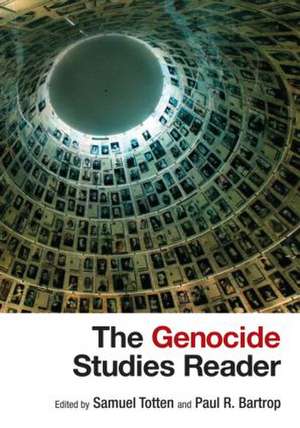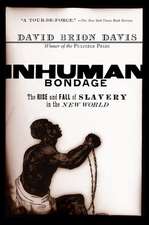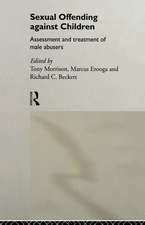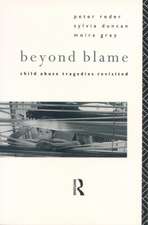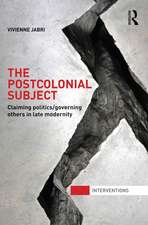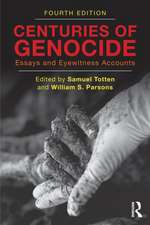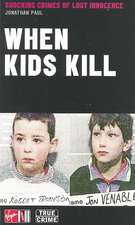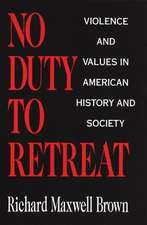The Genocide Studies Reader
Editat de Samuel Totten, Paul R. Bartropen Limba Engleză Paperback – 16 mar 2009
| Toate formatele și edițiile | Preț | Express |
|---|---|---|
| Paperback (1) | 448.49 lei 6-8 săpt. | |
| Taylor & Francis – 16 mar 2009 | 448.49 lei 6-8 săpt. | |
| Hardback (1) | 1353.32 lei 6-8 săpt. | |
| Taylor & Francis – 16 mar 2009 | 1353.32 lei 6-8 săpt. |
Preț: 448.49 lei
Preț vechi: 527.63 lei
-15% Nou
Puncte Express: 673
Preț estimativ în valută:
85.85€ • 93.28$ • 72.16£
85.85€ • 93.28$ • 72.16£
Carte tipărită la comandă
Livrare economică 21 aprilie-05 mai
Preluare comenzi: 021 569.72.76
Specificații
ISBN-13: 9780415953955
ISBN-10: 0415953952
Pagini: 568
Ilustrații: 9 black & white tables
Dimensiuni: 178 x 254 x 33 mm
Greutate: 1.04 kg
Ediția:1
Editura: Taylor & Francis
Colecția Routledge
Locul publicării:Oxford, United Kingdom
ISBN-10: 0415953952
Pagini: 568
Ilustrații: 9 black & white tables
Dimensiuni: 178 x 254 x 33 mm
Greutate: 1.04 kg
Ediția:1
Editura: Taylor & Francis
Colecția Routledge
Locul publicării:Oxford, United Kingdom
Cuprins
Part 1: Definitions of Genocide Section 1: The Origin of the Term Genocide and the Definition Used in the UN Convention on the Prevention and Punishment of Genocide 1. Genocide: A Modern Crime Raphael Lemkin 2. Development of the Rule on Genocide Lawrence J. LeBlanc 3. Intent Morten Bergsmo 4. The United Nations Convention on the Prevention and Punishment of Genocide Section 2: Alternative Definitions 5. The Definition of Genocide Israel Charny 6. Human Destructiveness and Politics: The Twentieth Century as an Age of Genocide Roger Smith 7. Defining Genocide as a Sociological Concept Helen Fein 8. Towards a Functional Definition Ward Churchill Section 3: Related Terms 9. A Typology of Cleansing Andrew Bell-Fialkoff 10. Explaining Ethnic Cleansing Michael Mann 11. Recognizing Genocides and Politicides Barbara Harff 12. Crimes Against Humanity William Schabas 13. Massacres Jacques Semelin 14. The New Concept of Democide Rudolph Rummel Part 2: Theories and Causes of Genocide Section 4: Theories of Genocide 15. The Origins of Genocide and Mass Killing: Core Concepts Ervin Staub 16. Deadly Regimes Alex Alvarez 17. Theories of Genocide Leo Kuper 18. The Etiology of Genocides Barbara Harff 19. Scarcity and Genocide Roger W. Smith 20. The Eight Stages of Genocide Gregory Stanton Part 3: Genocidal Crimes Section 5: Cases of Genocide 21. A Historical Summary Frank Chalk and Kurt Jonnashon 22. The History of Genocide: An Overview Paul Bartrop and Samuel Totten 23. Genocide Against Indigenous Peoples David Maybury-Lewis 24. Holocaust: Genocide of the Jews Donald Niewyk 25. State Rape: Sexual Violence as Genocide Lisa Sharlach 26. Report of the Security General, Kofi Annan, to the United Nations Security Council: The Fall of Srebrenica.' Pursuant to General Assembly Resolution 53/35 (1998) 27. Genocide in Darfur Samuel Totten Section 6: Comparative Studies of Various Cases of Genocide 28. The Modernity of Genocides: War, Race, and Revolution in the Twentieth Century Eric D. Weitz 29. The Armenian Genocide as Precursor and Prototype of Twentieth Century Genocide Robert F. Melson 30. Twentieth Century Genocides: Underlying Ideological Themes from Armenia to East Timor Ben Kiernan 31. Connecting Threads: Rwanda, the Holocaust, and the Pattern of Contemporary Genocide Mark Levene Part 4: The Complexities of the Prevention and Intervention of Genocide Section 7: The Issues of Sovereignty and Political Will 32. Realpolitik M. Cherif Bassouni 33. The Concept of Sovereignty and the Development of International Law Jackson Nyamuya Maogoto 34. The Dilemma of Political Will: How Fixed, How Malleable the Domestic Constraints? Bruce W. Jentleson 35. Intervention, Sovereignty and the Responsibility to Protect: Experiences for ICISS Ramesh Thakur Section 8: The Prevention of Genocide 36. From Early Warning to Early Action Kumar Rupesinghe 37. The Three P's of Genocide Prevention: With Application to a Genocide Foretold -- Rwanda Helen Fein 38. The Prevention and Intervention of Genocide Samuel Totten 39. A Good Man in Hell: General Romeo Dallaire and the Rwanda Genocide Section 9: Intervention of Genocide 40. Policies of Militarized Humanitarian Intervention Thomas G. Weiss and Cindy Collins 41. Economic Sanctions and Genocide: Too Little, Too Late, and Sometimes Too Much George A. Lopez 42. The East Pakistan (Bangladesh) Intervention of 1971 Francis Kofi Abiew 43. Vietnam's Intervention in Cambodia (Kampuchea), 1978 Francis Kofi Abiew 44. Against the Grain: The East Timor Intervention James Cotton 45. Reflections on the Legality and Legitimacy of NATO’S Intervention in Kosovo Part 5: Prosecution of Crimes Against Humanity and Genocide Section 10: Setting a Precedent: The Nuremberg Trials 46. The Path to Nuremberg Howard Ball Section 11: The International Criminal Tribunal for the Former Yugoslavia 47. The ICTY: Origin, Trials, and Tribulations Howard Ball 48. International Criminal Tribunal for the Former Yugoslavia Payam Akhavan and Mora Johnson 49. Radislav Krstic Becomes the First Person to Be Convicted of Genocide at the ICTY and Is Sentenced to 46 Years Imprisonment Section 12: The International Criminal Tribunal for Rwanda 50. The International Criminal Tribunal for Rwanda Peter Uvin and Charles Mironko 51. Formation of the ICTR Howard Ball 52. International Criminal Tribunal for Rwanda Michelle S. Lyon and Mark A. Drumbl 53. Historic Judgement Finds Akayesu Guilty of Genocide International Criminal Tribunal for Rwanda Section 13: Trials in National Courts 54. National Trials in Rwanda Jennifer Balint Section 14: The International Criminal Court (ICC) 55. Nuremberg's Legacy: Adoption of the Rome Statute Howard Ball Part 6: Denial of Genocide Section 15 56. A Classification of Denials of the Holocaust and Other Genocides Israel W. Charny
Notă biografică
Samuel Totten is a Professor at the University of Arkansas, Fayetteville. He is a co-founding editor of Genocide Studies and Prevention: An International Journal. He has also been a Fulbright Fellow at the Centre for Conflict Management, National University of Rwanda.
Paul R. Bartrop is an honorary fellow in the Faculty of Arts at Deakin University, Melbourne, Victoria, Australia, head of the department of history at Bialik College, Melbourne, and a Past President of the Australian Association of Jewish Studies.
Paul R. Bartrop is an honorary fellow in the Faculty of Arts at Deakin University, Melbourne, Victoria, Australia, head of the department of history at Bialik College, Melbourne, and a Past President of the Australian Association of Jewish Studies.
Recenzii
"The Genocide Studies Reader is a very useful introduction to the many acts of genocide all over the world as well as to the genocide studies field in general. Analyzing legal and sociological definitions and discussions, this book is an essential synthesis of the works produced in English on the subject."
—Dr. Daniel Feierstein, Director, Center of Genocide Studies, Universidad Nacional de Tres de Febrero, República Argentina
"This reader provides an excellent introduction to the field of genocide studies. Ranging far and wide, the volume includes foundational essays and covers key topics such as issues of definition, sexual violence, prevention, legal redress, intervention, and denial. It is a great resource both for classroom use and for scholars, students, and anyone interested in genocide."
—Alex Hinton, Center for the Study of Genocide and Human Rights, Rutgers, Newark
"It is no longer the historical occurrence of genocide that preoccupies social scientists, rather its disturbing recurrence in recent times despite the international conventions drawn up to protect human rights. To address this new reality, this instructive reader on the subject of genocide goes beyond the challenges of definition, theory, and history, and looks at the promise of intervention, prosecution, and prevention. All aspects of the problem of genocide are explored with particular attention to the issue of sovereignty and adjudication in the face of the hurdles of the claims of immunity and denials of responsibility. This collection of authoritative voices addressing this most serious crime against humanity brings new focus to the conflict between national and international interests and between standards of legality and the claims of state authority, and underscores no less the importance of studying the problem as much as developing the instruments to restrain mass violence."
—Dr. Rouben Adalian, Director, Armenian National Institute
"This is a truly excellent collection of readings and an important addition to the field of genocide studies. I very much look forward to using it with my students and thus giving them an additional opportunity to expand their knowledge of the field. Professors Totten and Bartrop are to be commended for putting together such an insightful and valuable collection of readings. Well done!"
—Steven Jacobs, The University of Alabama
—Dr. Daniel Feierstein, Director, Center of Genocide Studies, Universidad Nacional de Tres de Febrero, República Argentina
"This reader provides an excellent introduction to the field of genocide studies. Ranging far and wide, the volume includes foundational essays and covers key topics such as issues of definition, sexual violence, prevention, legal redress, intervention, and denial. It is a great resource both for classroom use and for scholars, students, and anyone interested in genocide."
—Alex Hinton, Center for the Study of Genocide and Human Rights, Rutgers, Newark
"It is no longer the historical occurrence of genocide that preoccupies social scientists, rather its disturbing recurrence in recent times despite the international conventions drawn up to protect human rights. To address this new reality, this instructive reader on the subject of genocide goes beyond the challenges of definition, theory, and history, and looks at the promise of intervention, prosecution, and prevention. All aspects of the problem of genocide are explored with particular attention to the issue of sovereignty and adjudication in the face of the hurdles of the claims of immunity and denials of responsibility. This collection of authoritative voices addressing this most serious crime against humanity brings new focus to the conflict between national and international interests and between standards of legality and the claims of state authority, and underscores no less the importance of studying the problem as much as developing the instruments to restrain mass violence."
—Dr. Rouben Adalian, Director, Armenian National Institute
"This is a truly excellent collection of readings and an important addition to the field of genocide studies. I very much look forward to using it with my students and thus giving them an additional opportunity to expand their knowledge of the field. Professors Totten and Bartrop are to be commended for putting together such an insightful and valuable collection of readings. Well done!"
—Steven Jacobs, The University of Alabama
Descriere
The reader covers key aspects of the most complex issues of genocide studies vis-à-vis the definition of genocide, theories of genocide, the prevention and intervention of genocide, and the denial of genocide.
